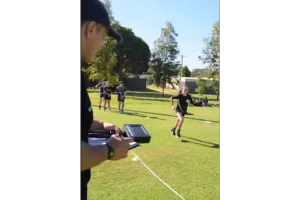
Helping Young Athletes Thrive: Why Parents Should Focus on Progress, Not Comparison
As parents of youth athletes, it's natural to want to give your child every opportunity to succeed. With countless training sessions, skill clinics, and competitions available, it can sometimes feel like more is always better. But when it comes to youth development, the truth is that quality matters more than quantity, and comparison can do more harm than good.
In this post, based on insights from Inner Athlete Podcast, we'll explore how parents can best support their young athletes - by encouraging focus on the right areas of growth, building confidence through personal bests, and fostering ownership of their athletic journey.
1/ More Isn't Always Better
Young athletes often feel pressure to constantly train or compete out of fear of "falling behind". Parents many unintentionally reinforce this by believing that extra sessions automatically lead to better results.
But the real question is: what specifically does your child need to improve on?
Have they spoken to their coach about key skills?
Do they know what areas of strength and conditioning could give them an edge?
Are they working toward clearly identified goals?
By narrowing down the focus, athletes can spend their time on the areas that actually matter - whether that's building strength, sharpening reach time or developing mental resilience.
2/ Celebrate Progress, Not Comparison
One of the biggest traps youth athletes fall into is comparing themselves to team mates or competitors. It's easy to feel disappointed when another player outperforms them, even if they've just achieved a personal best.
As parents, this is where you can shift the conversation:
Celebrate the PBs
Avoid unhealth comparison
Focus on controllables
This approach builds resilience and self-confidence that last beyond sport.
3/ Tracking and Feedback Builds Motivation
At Inner Athlete, we regularly track performance metrics and share progress reports with parents. For younger athletes, this isn't about records or leader boards, it's about showing them how their hard work is paying off.
When kids see that their jump has improved by six centimetres in just a few weeks or that they're moving better in the gym than before, they start to believe in their own progress. And when parents reinforce that feedback at home, motivation soars.
For older athletes, healthy competition can be introduced in measured ways, but the emphasis should always be on steady improved and performance in their sport.
4/ Fuel Matters More Than You Think
One fascinating example came from a simple experiment with young swimmers. Coaches gave them small amount of lollies (carbohydrates) before sessions. The results? Energy levels and performance instantly improved.
When the lollies were removed, output dropped, and the athletes noticed. Now, many bring their own snacks and meals to training, taking ownership of their nutrition.
For parents, this highlights the importance of fuelling:
Kids often come straight from school under-fuelled
A snack before training can drastically improve performance
Teaching athletes why food matters empowers them to make smarter choices.
5/ Building Agency: Teaching Kids to Take Ownership
Perhaps the most powerful lesson for parents is encouraging kids to take agency over their training. This means:
Asking athletes what they want to achieve and why
Helping their identify pain points
Supporting them in conversations with coaches
Encouraging them to notice patterns eg: how sleep or stress affects performance
When kids begin to connect their actions, like eating well, resting enough or putting effort into gym sessions, with their results, they naturally buy into the process.
Final Takeaway for Parents
The most valuable support you can give your child isn't more sessions, stricter routines, or constant comparisons, it's helping them:
Focus on the specific areas they need to improve
Celebrating their personal progress
Fuel their bodies to performance
Take ownership of their athletic journey
By guiding them toward self-awareness and confidence, you're not just helping them become better athletes, you 're equipping them with life skills that extend far beyond sport.
👉 Watch the full episode of the Inner Athlete Podcast https://www.youtube.com/watch?v=8pAlJwvXIP8 on YouTube or 🎧 listen on Spotify https://open.spotify.com/episode/3P9Yl45BbhcG6NKV5eSJu8
